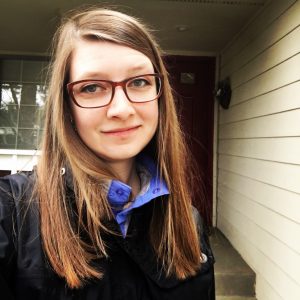How would your studies and / or your professional experiences advance the goals of WPA-GO? These goals may be found in the About Me section of WPA-GO’s website: http://wpacouncil.org/wpa-go (no more than 150 words) *
I work as a gWPA within a basic writing program—we are currently instituting significant changes to curricula, assessment, and institutional administration to address ongoing concerns about students’ outcomes. My research explores faculty and administrator experiences within this context, including how systemic and institutional factors (i.e., racist assessment practices, labor conditions, etc.) impact instructors’ teaching practices within basic writing courses. WPA-GO’s mission statement takes an active stance against racist assessment and administration practices, which has led to the creation of committees like the Taskforce for Antiracist Assessment. Because of the disproportionate representation of students of color and multilingual students in developmental writing courses, I believe that conversations about antiracist practices must also include discussions of how these practices may be embedded in basic writing curricula. Because of my experience as a gWPA and a researcher of basic writing programs, I believe I have much to contribute to these discussions within WPA-GO.
What kinds of support do you value as a graduate student and how would you further those forms of support for others through WPA-GO? (no more than 250 words) *
As a graduate student, I value being a part of a safe and supportive community of fellow graduate students and academics in writing studies through which I can find opportunities for networking, collaboration, and both professional and emotional support. As my graduate program is very small (I am one of only a handful of students on my campus interested in composition), I have appreciated the connections I’ve made with colleagues from across the US through communities like WPA-GO and NextGen. For the past two years, I have been a member of and/or co-chair of the local committee for the CWPA conference, responsible for planning the WPA-GO social at the conference. The WPA-GO social events at CWPA and CCCC offer opportunities for graduate students to network with each other and with junior and senior scholars in the field, as well as to meet people they may only know through social media. If elected to the WPA-GO graduate committee, I would continue to advocate for events that provide opportunities for socializing and networking between graduate students. For example, in the past, WPA-GO has hosted online workshops on a variety of topics through platforms like Zoom—these workshops could provide important avenues for networking and professional development, particularly for folks who cannot attend CCCC or CWPA, or who otherwise don’t have consistent access to similar opportunities. As a member of the graduate council, I would advocate for and personally support efforts to develop such workshops.
CWPA pledges to “foster inclusion more generally; promote research into student diversities; promote policies that increase diversity in our membership and in the population of people who administer writing programs; and explicitly act against the structures that cause injustice today,” and WPA-GO is dedicated to supporting this mission. How will your selection to the WPA-GO Graduate Committee advance these goals? Please answer this question by choosing one barrier you identify to meeting these goals in writing studies. How would your work within WPA-GO specifically address this barrier? (no more than 500 words) *
While my research and professional experiences have often intersected with the structures that enable continued racial, cultural, linguistic, and socioeconomic injustice in the US education system, I myself have never experienced this kind of discrimination. As a white, cis-gender, able-bodied, native English-speaking woman, I am aware that I am complicit in structures that systematically disadvantage students from diverse backgrounds and work continuously to interrogate the ways I may be perpetuating harm in my teaching and administration. I believe that one barrier to meeting the goals outlined by CWPA is the inequitable and unsustainable labor conditions to which many graduate students and composition instructors are subjected. The corporatization of colleges and universities across the US has increasingly led to the adjunctification of our teaching force—as noted in the 2016 CCCC Statement on Working Conditions for Non-Tenure Track Writing Faculty, perhaps nowhere is this more true than in composition programs. Speaking of the impacts of contingent labor within writing programs, Schell (2004, qtd. in Babb & Wooten, 2017) notes that “we cannot pretend that instructional quality is not affected by working conditions” (p. 170). In my own research I have found that basic writing faculty’s instructional practices are deeply impacted by unfair working conditions—when combined with a top-down style of administration that has emphasized “proficiency” over students’ progress, many instructors I’ve interviewed have admitted to engaging in harmful (and racist) practices that they themselves do not agree with for fear of losing their jobs. Within WPA-GO, I believe that I could contribute the knowledge I have gained through my research, my work as a gWPA in a basic writing program that primarily employs adjuncts, and my own experience as contingent faculty to ongoing conversations about the intersections between labor conditions in writing programs and racism and racist practices in writing studies. The recent report from the WPA-GO Labor Taskforce show definitive evidence that, like adjuncts, most graduate students in writing studies experience poor working conditions—one question I believe needs to be asked is, how do these conditions effect graduate students’ teaching practices? As a member of the WPA-GO graduate committee, I would advocate for continued research into the effects of poor working conditions, not only on graduate students’ mental, emotional, and financial well-being, but also on their practices as teachers, administrators, and students. This research could be valuable not only to the field of writing studies writ large, but to members of WPA-GO who may themselves go on to become WPAs in charge of writing programs inhabited by graduate students, adjuncts, and other contingent faculty.
